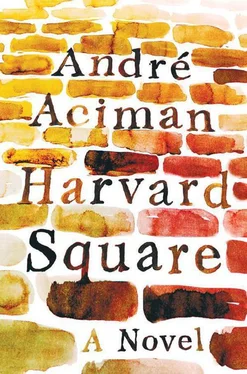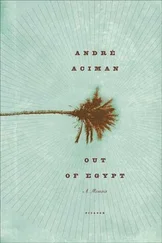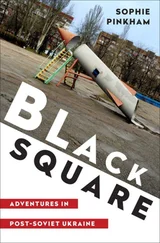An hour into the ache I figured I might as well return to the infirmary. As irony would have it, I had no money left to take a cab and was too much in pain this time to walk myself to the Square. I called Kalaj, but once again there was no answer. Linda had no car — so there was no point in waking her. Allison, I didn’t dare call. Sexual intimacy was one thing, pain-and-money intimacy, quite another. Frank and Claude, out of the question. I couldn’t have felt lonelier or more helpless in my life. So with complete despair, I decided to knock at the kitchen door of Apartment 43. It took them a while, but eventually the boyfriend opened the door, wearing nothing but pale blue boxers. Obviously I had woken him up. “So sorry, I know it’s very, very late, but I’m in great pain. Can one of you drive me to the infirmary in the Square?” I was begging for help. I had never in my life felt so denuded of dignity. On second thought, perhaps I should have called an ambulance. But it was now too late for this. “It’ll take me a second,” he said. I heard him whispering to his girlfriend, explaining, using my name. So they knew me by name. Even doubled over in pain I wondered if she’d ever liked my name or whispered it to herself when she was alone.
The car smelled of their dog. “I hope it’s nothing,” said the boyfriend, who insisted on dropping me at the door of the emergency entrance and then helping me out of the car, holding me with one hand under my armpit as I limped to the door.
I was admitted by the same head nurse and the same doctor as before. As soon as I was stretched out on the gurney, the pain began to subside. Could it all be psychosomatic? Most people feel better the moment they step in here, said the genial head nurse in her British accent. As she sat down and spoke with me — there were no other in-patients that night — she began to ask me where I came from… I figured it was small talk to get me to relax. I normally answered the where-from question by saying France. Then when asked more specific questions I might add Paris. If the person happened to know French well and was in a position to detect my accent, I’d instantly switch and say that I was really from Italy, which would sufficiently throw them off the scent and prevent them from inquiring further into my origins. But this time I wanted to open up to someone without too many detours and went directly to the source: Egypt, I said.
“Well, you don’t say!” she said. She had been trained as a nurse in Egypt, during World War II.
I asked where.
“In Alexandria.”
“That’s where I was born!” More coincidentally yet, it was in an English hospital that my mother was trained as a volunteer nurse during the same war.
I missed my mother, I said. Suddenly I wanted to cry. What was happening to me? Was I going to be very sick? What was this pain? And as I lay there I remembered Kalaj’s own words, What happens to me now? What happens to me now? I started to feel the tears roll down both sides of my face.
Without a word, the nurse reached for a tissue and wiped one side of my face, and then the other.
There was something so irreducibly earnest and guileless between us that I was perfectly happy to spend the rest of the night in that area with the head nurse sitting next to me in the dimmed lights of the emergency room. “Maybe I should let you rest a while,” she said. But she didn’t move. Perhaps all she meant was there was no need to talk.
Toward dawn, they decided to admit me to an upper floor. By then they’d had a chance to look over last week’s test results. The head surgeon was going to speak to me. He was an early morning type, so I shouldn’t get too comfortable, said my new nurse.
The doctor knocked at my door around seven in the morning, carrying a manila envelope with the X-rays sticking out. He slipped them under the glass panel with the gliding, effortless grace of a man who does this thirty times a day, lit the panel with a cavalier flick of the switch, and after musing a while at what looked like an off-gray paisley design called my inner organs, said that I had gallstones. The Jewish organ par excellence, I jibed. The tall WASP gentleman stared at me with a quizzical look, more amused perhaps by my attempt to be funny than by the joke itself. “I thought Jews were obsessed with another part of the male anatomy.”
The man had a sense of humor.
He sat on my bed, crossed his legs, dangling his top leg up and down, while his penny loafer hung from the tip of his toes, exposing his entire sock.
“Anyone else in the family with gallstones?”
“All of them.”
“On both sides?”
“All four of my grandparents.”
What had I had for dinner last night?
I said, Maison Robert, as though that offered explanation enough.
A long silence elapsed between us.
“Is this going where I think it is?” I finally asked.
He bit his lower lip, looked at me, and said, “What do you mean?”
“Knife?” I asked.
He liked my joke.
“Well, we don’t like to say ‘knife.’ The dictionary is full of friendlier terms — but the long and short of it is probably yes .”
The operation was not urgent. But I had to watch my diet. No fats, no alcohol, no coffee. Meanwhile, they wanted to run a few more tests, so I should stay in bed and eat the bland food they fed me on the house.
“May I ask a question?” I finally said.
“It won’t hurt,” he answered. Apparently everyone asked that same question.
“No, that was not my question.”
“Yes?”
“How long after the operation can I have sex?”
He smiled.
“You will be very tired afterward.” And to send the message home, he let his head slump down to his chest.
I called no one. I wanted to be alone. I was ashamed of being stricken with an old man’s ailment. Might as well have the ague or the gout. By around two that afternoon, I heard a timid knock at the door. It was Allison. How on earth had she found me here? My phone wasn’t answering. She’d been ringing all morning. Rather than suppose I never wanted to see her, or had spent the night with someone else, she’d assumed the worst and checked with the hospital. What amazing confidence in herself, in people, in the power of truth and candor. In her place, the first thing I would have imagined was that I had disappeared — or, better yet, absconded with her father’s twenty-dollar bill. If only all humans were like her and thought her way, there wouldn’t be an oblique ripple left on earth.
She sat next to my bed and we spoke. She held my hand. By the way, she had some bad news. What? Chlamydia.
“Not—” I started.
“No, from me,” she said.
“Does that mean I have it too, now?”
“Yes.” The good news is that her parents loved me. They thought I was funny. They loved the way I’d complained there were no fish knives at Maison Robert. It was typical of them to have noticed this.
Later that afternoon, one or two students straggled into my room, then a few teaching fellows, colleagues. Professor Lloyd-Greville dropped in to say hello. He too, apparently, had heard. Then my entire sophomore tutorial. There were about sixteen of us in the room, the hospital staff came and complained there was too much noise and that no one was allowed to smoke.
“But I smoke,” I protested.
“Well, you can, but no one else can. And, by the way, you shouldn’t either.”
Mrs. Lloyd-Greville showed up with a tiny pot of verbena from her garden and a box of chocolates. “They’re not for you, of course, but for your guests.” It was a double-decker box with a transparent parchment sheet placed above the chocolates indicating the intricate ingredients of the equally intricate assortment. The box was being passed around the crowded room when the unthinkable finally occurred. Kalaj walked into the room, bearing three porno magazines. I wanted to disappear under my bed covers. By eight-thirty, long after official visiting hours were over, I heard the loud voice of a woman. It was Zeinab, who had heard the news through the grapevine on Harvard Square. Then, minutes later, Abdul Majib, the old Iraqi kitchen attendant from the Lowell House kitchen, decided to make an appearance as well.
Читать дальше












